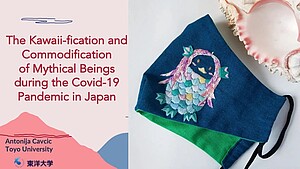Culture, sciences et société
La Maison Universitaire France-Japon, en collaboration avec The Japan Society for the Promotion of Science (JSPS), a le plaisir de vous convier à la conférence intitulée « The Kawaii-fication and Commodification of Mythical Beings during the Covid-19 Pandemic in Japan » qui aura lieu mardi 12 mars à 17h30 à la Maison France-Japon.
Invité : Dr Antonija Cavcic, Faculty of Letter-Toyo University, Professeure invitée-Université de Strasbourg
Conférence tout public, en anglais
Résumé:
With their roots in animism and Shintōism, Japan’s mythical creatures known as 'yōkai' have been feared, revered, and used to explain calamities or inexplicable phenomena. Needless to say, in the early stages of the Covid-19 outbreak, very little was known about the origins of the virus, its potency, and how it could be prevented or treated effectively. Naturally, this threw most countries in the world into a state of confusion, and Japan was no exception. However, as opposed to seeking answers from conspiracy theories to make sense of the unknown, Japan turned to Amabié(アマビエ)—a mermaid-like yōkai known for prophesizing either an impending epidemic or abundant harvest. While Amabié offers no explanation, advice or immediate help, it is believed that by recreating Amabie's image, people can defend themselves against illness. Whether it was simply a trend or inspired by hope is debatable, but countless artists, city councils, product manufacturers, and shrines around Japan took advantage of the myth and produced and promoted products with images of Amabié from early 2020. Although their motives varied and a sense of hope inspired the production and consumption of Amabié, in this presentation I argue that the profit factor was a major incentive for shrines and businesses who invested in the trend. I will demonstrate this by drawing upon previous research on the commodification of religion while providing examples of the commodification of Amabié by local, corporate and religious organizations.
Document à télécharger
- Nom du fichier : cavcic1706720427.pdf Poids du fichier : 165 Ko















